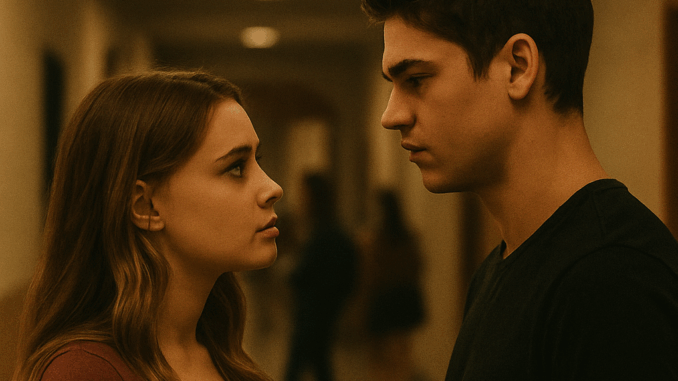
When it comes to cinematic romances that grip the hearts of viewers, few films have sparked as much passion and debate as After. Adapted from Anna Todd’s bestselling novel, the first installment of the series throws audiences headfirst into the complicated, messy, and often painful journey of Tessa Young and Hardin Scott. What begins as an accidental meeting quickly spirals into a love story defined by contradictions—innocence versus rebellion, light versus darkness, stability versus chaos. It is precisely this opposition that makes their story so compelling.
At the core of After lies the question: what happens when two people from utterly different worlds collide? The answer is a rollercoaster of emotions, one that resonates deeply with young adults searching for identity, love, and meaning.
Tessa Young: The Portrait of Innocence
Tessa Young enters college as the very definition of composure and order. She is intelligent, diligent, and determined to follow the path that has been carefully laid out for her—excel academically, graduate with honors, and settle into a safe and respectable life. Her relationship with her high school sweetheart, Noah, embodies this safe zone. Noah is polite, dependable, and adored by her family.
For Tessa, life seems predictable in the best possible way. She thrives on structure and discipline, embodying the values of trust, honesty, and simplicity. Her room is neatly organized, her essays are always polished, and her future looks clear. Yet beneath this carefully constructed identity lies the quiet yearning for something more—a spark, an adventure, a challenge that she cannot quite name.
Hardin Scott: The Force of Rebellion
If Tessa embodies order, Hardin Scott embodies chaos. From the moment he appears on screen, his presence is magnetic. His tattoos, brooding eyes, and dismissive attitude toward authority create a sense of danger that is both alluring and unsettling. He is the archetype of the bad boy: unpredictable, passionate, and burdened by inner demons.
Hardin is haunted by pain from his past and expresses it through cynicism and rebellion. His worldview is steeped in mistrust, and he treats vulnerability as weakness. Yet beneath his harsh exterior lies a desperate craving for connection, even if he refuses to admit it. Hardin is not just reckless—he is a storm that resists control.
Love as Conflict: Purity Versus Darkness
What makes Tessa and Hardin’s relationship so unforgettable is the way it embodies extremes. Their love is not gentle but volatile. For every tender moment, there is an equal measure of heartbreak. For every promise, there is a betrayal.
Tessa’s purity collides with Hardin’s chaos, creating a relationship that feels both intoxicating and toxic. This duality reflects a universal truth about young love: it is often messy, confusing, and filled with contradictions. The passion that ignites between them is as much about discovering themselves as it is about discovering each other.
The narrative dares to ask whether love can truly bridge the gap between two such opposing worlds. Can innocence soften rebellion? Can rebellion awaken innocence without destroying it? These questions linger long after the credits roll.
Transformation Through Love
As the story unfolds, both Tessa and Hardin undergo transformations. Tessa, once the epitome of control, begins to embrace risk, passion, and independence. Her encounters with Hardin force her to step outside the lines drawn by her mother, her boyfriend, and society. She discovers that life cannot be lived solely in black and white; sometimes, it thrives in shades of gray.
Hardin, too, begins to shift. His walls start to crack as Tessa’s presence forces him to confront his vulnerabilities. For perhaps the first time, he allows himself to feel deeply, even if those feelings terrify him. Love becomes his redemption, even as he resists it.
Their growth is neither linear nor smooth. Setbacks and betrayals threaten to undo everything. Yet through it all, they cannot deny that they have changed each other in profound ways.
Why Their Story Resonates
The appeal of After lies in its honesty about the complexities of love. Unlike fairy-tale romances where everything falls into place, Tessa and Hardin’s relationship is raw and imperfect. It reflects the real experiences of many young people who find themselves torn between what they have been taught to desire and what their hearts truly crave.
The film taps into universal themes: the allure of the forbidden, the struggle for identity, and the desire to be truly seen. Tessa’s journey speaks to anyone who has felt the need to break free from expectations, while Hardin’s story resonates with those who have battled inner darkness.
Together, their story reminds us that love is not always about perfection—it is about transformation.
